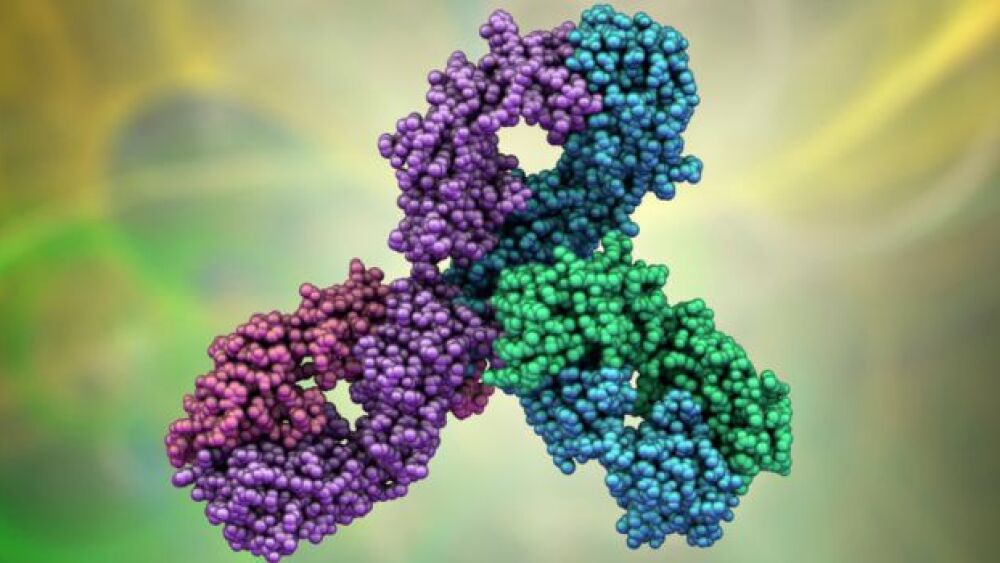While approved in non-small cell lung cancer, Keytruda failed to provide benefit for the TKI-resistant, EGFR-mutant subtype of the disease.
Pictured: Illustration of Merck’s Keytruda (pembrolizumab)/iStock, Dr_Microbe
Merck’s cancer immunotherapy treatment Keytruda(pembrolizumab) has a list of approved indications, including non-small cell lung cancer. Yet the latest data shared at this year’s American Society of Clinical Oncology meeting is a bit of a cautionary tale: for a particular subtype of the cancer, the blockbuster drug doesn’t work.
After an initial readout of the Phase III KEYNOTE-789 trial earlier this year, Merck shared the full data this week. Patients with metastatic nonsquamous NSCLC who had progressed after treatment with a tyrosine kinase inhibitor (TKI) of the epidermal growth factor receptor (EGFR) inhibitor did not benefit from Keytruda, a programmed cell death protein 1 (PD-1) inhibitor.
Patients on Keytruda and chemo survived a median of 15.9 months versus 14.7 months for those on chemo alone, which was not enough to reach statistical significance. Overall survival rates at 24 months were 30.6% for the Keytruda group versus 26.4% for the control.
The study concluded that adding Keytruda for these TKI-resistant, EGFR-mutant NSCLC patients did not meet the primary endpoints of prolonging progression-free survival or overall survival.
These results have “significant implications for clinical practice,” Jyoti D. Patel, professor of medicine at Northwestern University, said in an ASCO press release. Many oncologists generalized previous trial results to include all NSCLC patient populations.
“[T]his study clearly demonstrates that chemo-immunotherapy is not suitable for EGFR+ NSCLC patients after progression on osimertinib,” an EGFR inhibitor that some patients in the study had previously failed to respond to, he continued. “Immediate changes in patient care are necessary to avoid unnecessary toxicity and focus on more effective treatment strategies.”
A Merck spokesperson told Fierce Pharma that about half of the patients enrolled in KEYNOTE-789 had failed on Tagrisso (osimertinib), the most potent EGFR inhibitor today.
Separately, Tagrisso posted positive results Sunday at ASCO, citing a 51% drop in the risk of death after five years for post-operative NSCLC patients with EGFR mutations.
Not all Bad News for Keytruda
Meanwhile, Keytruda also proved promising in another subtype of NSCLC. Phase III data from another trial showed it improved event-free survival for patients with stage II, IIIA or IIIB NSCLC. Merck has already submitted a supplemental BLA to get approval for these forms of NSCLC added to its list. The agency’s target action date is mid-October.
Merck is also combining Keytruda with Eisai’s Lenvima in multiple indications, including metastatic NSCLC with disease progression after an anti-PD-1 monoclonal antibody. The estimated completion date for the study is listed as February 2026. The collaborative program has experienced highs and lows, with two wins alongside multiple fails.
Keytruda is not only Merck’s best-seller but also one of the best-selling drugs in the world, bringing in close to $21 billion in revenue for the pharma giant in 2022.
With the already-approved market so large, analysts aren’t concerned by this latest failure.
“We do not see it as an issue,” Mara Goldstein, managing director of Mizuho Securities, told BioSpace in an email, noting the specificity of the patient population. “We see KEYTRUDA continuing to grow through its loss of exclusivity based on the ability to advance the drug into earlier lines of treatment.”
Kate Goodwin is a freelance life science writer based in Des Moines, Iowa. She can be reached at kate.goodwin@biospace.com and on LinkedIn.






